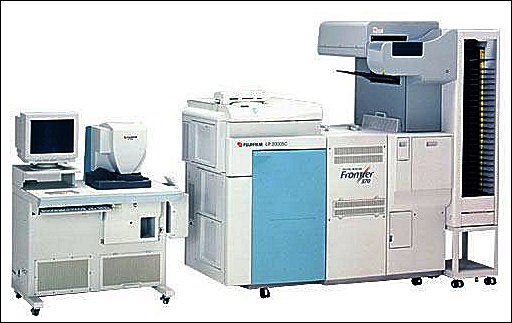Guidelines for Choosing
a Lab
by Mitch Moraski
 The
latest figures show that 89% of all households have some form of
photographic product in their home. My mom is 84, and she still takes
pictures! Today both digital and film processing and printing are more
available than ever. Department stores, grocery stores, and drug stores
all offer one-hour or same day processing and printing. These big
corporations see processing as a loss leader that brings customers into
their stores where they will make more purchases. The
latest figures show that 89% of all households have some form of
photographic product in their home. My mom is 84, and she still takes
pictures! Today both digital and film processing and printing are more
available than ever. Department stores, grocery stores, and drug stores
all offer one-hour or same day processing and printing. These big
corporations see processing as a loss leader that brings customers into
their stores where they will make more purchases.
How has this affected the small privately owned labs? Some labs in
large metropolitan areas have had to shut their doors while some others
have not only remained open but are alive and thriving by offering the
quality, service and knowledgeable employees behind the counter that you
can't find at a drug store.
 |
Processing at the Drug Store,
Department Store, and Supermarket
Photo kiosks, and picture drops can
be found almost everywhere today. The price is cheap and the
quality is fine for the average snapshooter but often falls far
short of the expectations of serious photographers. |
As a lab owner for eleven years and photographer for over twenty, let
me share with you what has separated small labs from corporate America,
what characteristics to look for in a good lab, and why you should be
looking for a good lab in your area. All the money in the world spent on
top-notch equipment won't mean anything if the lab does a lousy job with
your prints.
For the sake of brevity in this article I'll use "processing"
to refer to developing and printing film and printing from digital media.
A Real Difference
So what's the difference between the multi corporate processing labs and
the privately owned labs? First of all, processing and printing images is
what they do. If they don't produce the best possible image from a given
medium, then you might as well do business with the "other guys"
so they have a lot to lose; whereas the big stores just see processing as
a loss leader to get you in the door. Since it's not their main business
the loss of one customer won't make much difference to their bottom line.
Small labs will provide personalized service because they depend on every
customers business to make their mortgage.
But that doesn't mean that every lab is great just by virtue of being
small. When searching out a lab there are some important questions to ask:
Do you color correct and adjust every image for density and
overall quality? Drug stores and department stores send your images
out for automated processing by a machine. No machine is a match for the
human eye for correcting for subject and color. If a lab is simply
running your prints through a machine there is on reason to pay a
premium for their service.
Do you hand inspect each and every image before my negatives are
cut and sleeved? Often times "labs" will cut and sleeve
your negative before the prints come out of the dryer. Are your
negatives sleeved? Tossing negatives into a paper envelope is OK for the
casual shooter. But doing so makes it likely that the negatives will be
scratched and will attract dust and dirt. Also the glues and chemicals
in some papers can accelerate the aging process of the negatives. A good
lab will sleeve your negatives in an archival plastic sleeve.
Do you reprint unsatisfactory images at no additional charge to
the customer? If the lab makes a mistake, misses dust or hair on a
negative, or if the color correction is off - they should be willing and
happy to correct their mistake with no charge or argument.
Is your chemistry monitored on a daily basis? Errors in mixing
chemicals will ruin your negatives and chemicals loose potency with age.
Daily monitoring is critical.
What is their background in color management and photography?
My lab manager has seventeen years of lab experience, ten years as a
professional photographer, and my head of digital operations has a BA
degree in print making and digital operations. I think we have a great
staff! Other credentials you may find include Certified Photographic
Counselor in the Society of Photographic Counselors, and Certified
Photofinisher in the Society of Photo Finishing Engineers. But one
specific title isn't the most important thing. You should be concerned
with experience and ability.
Do several employees participate in the printing process or just
one or two? Everyone has their own opinion as to what constitutes a
good print. If you drop off your film on five occasions and five
different people print your images you may feel that you're getting
inconsistent quality. When you pick up prints find out who did the
printing. Over time you'll find the person in the lab whose tastes match
your own. Then make it a point to ask for and work with that individual.
That way they'll have a feel for what you're looking for in your prints.
Ideally you want to work with someone who shares your love of
photography. They'll handle your prints as if they were their own. You
don't want someone who sees it as "just another job".
The need to communicate is important. If you have questions, a good lab
will spend the time with you and help you gain knowledge in all aspects of
photography, printmaking and color management. It's easy to blame yourself
for poor images, when in fact the processing was of poor quality.
The Process
It helps to understand how a print is made in the lab. All your images are
previewed on our computer monitor. The technician sees four images
simultaneously and adjusts for color and density on each one. If one image
looks too magenta, they subtract magenta with a simple push of a button
until the print looks correct. Every roll should be treated the same,
whether it be from disposable camera or a $1,000 SLR. Some labs will even
offer customers the opportunity to watch them print their images so they
may have a better understanding of the process. Most photographers have
very little knowledge about the latitude and ability to work with color
adjustments that are available from color negatives. But be considerate of
the lab as well. Don't ask for this kind of personal time on a holiday
weekend when they're getting slammed. Slow times are best.
|

|
| Amazing Machines
The "mini-lab" machines
used by today's photo labs are nothing short of amazing. The best
of them will handle negatives, slides, and a variety of digital
memory cards and are capable of providing not only prints but CDs
with digital versions of your images - even if you're shooting
with film. |
Honesty goes a long way and you should expect it from your lab. If they
can't produce an acceptable image from a negative or digital file
(underexposed, blurry, etc.) they should be up front with you. If you're
unsure of what a lab can do, or you've been using drug store processing,
bring in some negatives and ask them to redo the prints. Then sit with
them at the counter and ask them to explain why there is a difference in
the results. A good lab will be willing to educate you about the process.
It's no secret that small labs cannot compete on price with the big
bulk processors that service the drug stores and department stores. When
you go to a small lab you're paying for quality and service. How many
professional photographers do you know that bring their film to a
drugstore, department store or some other low priced mail order house?
My lab services some of Vermont's most elite photographers. The reason
is that they are able to communicate with us and they're assured of the
quality and handling of their images. They need to be sure. Their images
are their livelihood.
If you're serious about your photography, get serious about who's
printing your images. Spend the time to find a good lab in your area.
You'll be amazed at the quality difference.
 Subscribe to
Vivid Light
Subscribe to
Vivid Light
Photography by email
Tell
Us What You Think
|
